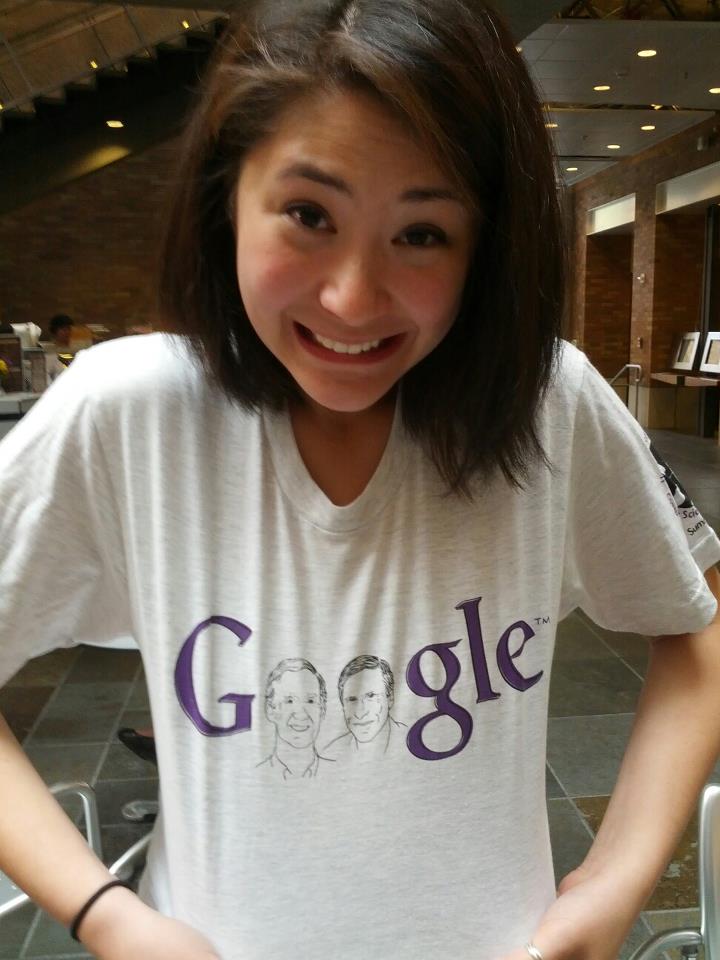 Zorah Lea Fung models the 2012 Google Seattle summer intern t-shirt, featuring Ed Lazowska and Hank Levy as the two O’s! “How cool is that?” say Ed and Hank!
Zorah Lea Fung models the 2012 Google Seattle summer intern t-shirt, featuring Ed Lazowska and Hank Levy as the two O’s! “How cool is that?” say Ed and Hank!
Nice GeekWire post here: “It is typical to see star athletes immortalized in this way on campus, but pretty rare for the geeks to get their due. We’re not sure who made the shirt, but seeing Lazowska and Levy in the middle of the Google logo certainly cracked us up.” Read more →
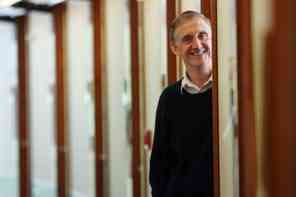 An article on MOOCs (Massive Open Online Courses) in the Seattle Times Pacific NW Magazine leads with UW CSE alum Greg Linden and quotes UW CSE professor Ed Lazowska:
An article on MOOCs (Massive Open Online Courses) in the Seattle Times Pacific NW Magazine leads with UW CSE alum Greg Linden and quotes UW CSE professor Ed Lazowska:
“Seattle tech entrepreneur Greg Linden … decided to go to college – without leaving home.
“Through Stanford University, he took a class on robotic-car programming from professor Sebastian Thrun, who led the team that designed Google’s self-driving car.
“He also scarfed down a class on computer program design from Google Research director Peter Norvig, who used to oversee computational sciences at NASA. And he gobbled up a class on machine learning from another Stanford professor who directs the university’s Artificial Intelligence Lab.
“All the classes were online, open to anyone. Linden didn’t have to fill out an application or send in his transcripts …
“In July, the UW became one of 12 top-tier universities that joined one of the online startups, Coursera, launched by two computer-science professors at Stanford. The UW’s free classes are expected to begin this fall …
“Ed Lazowska, who holds the Bill & Melinda Gates Chair in Computer Science & engineering at the University of Washington, says advanced technology can be a powerful tool in helping educate large numbers of people and, just as importantly, figuring out how people learn best.”
Read more here. Read more →
 A terrific Seattle Times opinion piece – a companion piece to the article cited in the previous post:
A terrific Seattle Times opinion piece – a companion piece to the article cited in the previous post:
“A modest proposal: Stop gutting one of the state and region’s most important competitive assets: higher education, especially the University of Washington.”
Read it here. (See a post on a related article here.) Read more →
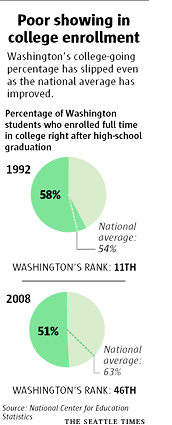 This excellent (if depressing) article in the Seattle Times exposes the gaps in Washington’s education system:
This excellent (if depressing) article in the Seattle Times exposes the gaps in Washington’s education system:
“We think of ourselves as a well-educated state, and in many respects we are. More than half of Seattle adults 25 and older hold a bachelor’s degree, making it one of the most well-schooled cities in the nation.
“So it may come as a surprise that only about one in four public-school students from Washington’s high-school class of 2009 will finish college by 2015, according to a Seattle Times analysis of recent trends.
“While the percentage of high-school graduates who went to college jumped by nine points in the United States over the past two decades, the percentage of college-going high-schoolers in Washington fell.
“We were once well above the national average for the percentage of high-school students who go on to a two- or four-year college. But today, by some measures, we are one of the lowest states in the country …
“As University of Washington computer science professor Ed Lazowska says: ‘We are creating great jobs, and they’re going to other people’s children.'”
Read the article here. Learn additional facts about STEM education in Washington State here. (See a post on a related opinion piece here.) Read more →
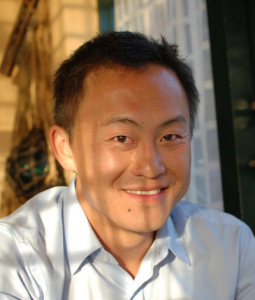 Captricity, a service that wants to make the paper-to-digital conversion faster and cheaper, was co-founded by UW CSE bachelors alum Kuang Chen. (Kuang recently received his Ph.D. from UC Berkeley advised by Joe Hellerstein and UW CSE Ph.D. alum Tapan Parikh.) Writes PandoDaily:
Captricity, a service that wants to make the paper-to-digital conversion faster and cheaper, was co-founded by UW CSE bachelors alum Kuang Chen. (Kuang recently received his Ph.D. from UC Berkeley advised by Joe Hellerstein and UW CSE Ph.D. alum Tapan Parikh.) Writes PandoDaily:
“The service is a result of cofounder Kuang Chen’s trip to Tanzania, where he worked at an HIV treatment center. After being tasked with finding patients that had started on anti-retrovirals, but for one reason or another had stopped taking them, Chen had to work his way through scattered papers and attempt to gather as much data as possible from them. He decided that it was time to bring digitization that would be powerful enough for enterprise customers but cheap enough for third-world organizations, and Captricity was born.”
Read the post here. Read more →
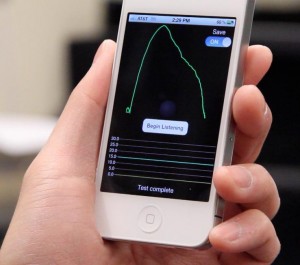 “Is there anything a smartphone app can’t do? Researchers at the University of Washington, UW Medicine and Seattle Children’s hospital have figured out how to let people measure their own lung health by breathing in the direction of the standard microphone on a smartphone, without any specialized attachments.
“Is there anything a smartphone app can’t do? Researchers at the University of Washington, UW Medicine and Seattle Children’s hospital have figured out how to let people measure their own lung health by breathing in the direction of the standard microphone on a smartphone, without any specialized attachments.
“Here’s the cool part: The results from the app are within 5 percent of those from commercial spirometers that run into the thousands of dollars. That level of accuracy means the app is already meeting medical standards.
“The app, called SpiroSmart, analyzes the sound waves from a strong exhale to judge the health of the person’s lungs.”
Read the post here. Read a UW News release here. Read the SpiroSmart research paper here.
Related articles: KOMO TV News video here. C|net here. New York Daily News here. Read more →
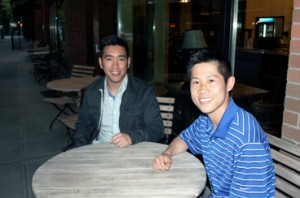
Tenacity Sports co-founders Don Le and Jon Tam
Tenacity Sports – a Seattle-based startup co-founded by UW CSE alum Don Le and his friend Jon Tam – is developing a new website called Gametiime, an online service that will help people discover, compare, and share running activities around the local area.
Our friends at GeekWire profiled Tenacity Sports today. Read the article here. Read more →
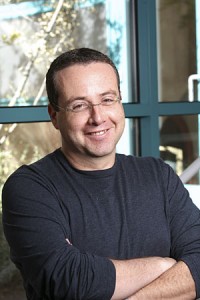 Elhanan Borenstein, assistant professor of Genome Sciences and adjunct assistant professor in CSE, has been recognized in the NIH “High Risk High Rewards” program.
Elhanan Borenstein, assistant professor of Genome Sciences and adjunct assistant professor in CSE, has been recognized in the NIH “High Risk High Rewards” program.
According to NIH Director Francis Collins, the High Risk High Reward program “provides opportunities for innovative investigators in any area of health research to take risks when the potential impact in biomedical and behavioral sciences is high.”
Borenstein researches the human microbiome – the complex ensemble of microorganisms that populate the human body. Borenstein and his team are building a comprehensive computational toolkit for designing microbiome manipulations and for discovering possible routes for microbiome-based therapy.
Read a UW News article here. Learn more about Borenstein’s work here. Read more →
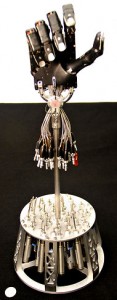 This New York Times article on modern robotics – largely focused on Rodney Brooks’s company Rethink Robotics – also discusses innovations by UW CSE’s Emo Todorov:
This New York Times article on modern robotics – largely focused on Rodney Brooks’s company Rethink Robotics – also discusses innovations by UW CSE’s Emo Todorov:
“In contrast to the fixed repetitive tasks performed by today’s robot arms and hands, scientists at the University of California, San Diego, and the University of Washington have built several prototype hands with pliable fingers that can move as quickly as humans’ …
“‘Despite decades of automation, there are relatively few types of tasks that have been automated,’ said Emanuel Todorov, a cognitive scientist at Washington.
“This is now changing rapidly as a new wave of manufacturing robots appears, driven by the collapsing cost of computing and the rapid emergence of inexpensive sensors that give robots new powers of vision and touch.”
Read more here. Learn about Emo’s research here. Read more →
 “A recent survey of 1000 adults found a majority thought cloud computing actually referred to a “fluffy white thing.” Fifty-one percent also believed storms could interfere with it, according to the survey sponsored by Citrix.
“A recent survey of 1000 adults found a majority thought cloud computing actually referred to a “fluffy white thing.” Fifty-one percent also believed storms could interfere with it, according to the survey sponsored by Citrix.
“Those statistics are evidence that many computer users do not fully understand this new, important technology …
“‘Seattle is really ground zero for cloud computing with the presence of Amazon, founded here, Microsoft here and Google having a substantial presence here as well,’ said Bill Howe, a [UW CSE] professor.
“Thanks to the cloud, new companies no longer need to fill rooms with massive computer servers to store their data.
“‘We’re able to innovate in a way we’d never be able to innovate without using these cloud services,’ said Shauna Causey of Decide.com, a [UW CSE] Seattle startup.”
Watch the interview here. Read more →
 Zorah Lea Fung models the 2012 Google Seattle summer intern t-shirt, featuring Ed Lazowska and Hank Levy as the two O’s! “How cool is that?” say Ed and Hank!
Zorah Lea Fung models the 2012 Google Seattle summer intern t-shirt, featuring Ed Lazowska and Hank Levy as the two O’s! “How cool is that?” say Ed and Hank!









